Ali Boyle (Cambridge): “Don’t Ask: Classification in Comparative Cognitive Science”
Ali Boyle (Cambridge): “Don’t Ask: Classification in Comparative Cognitive Science”
Many projects in comparative cognitive science (which I mean to include research in both comparative psychology and artificial intelligence) are structured around what I’ll call ‘classificatory questions’ – that is, questions about whether nonhuman cognitive systems have the same cognitive capacities as humans. These projects […]




Connect with us
Facebook
Twitter
Youtube
Flickr